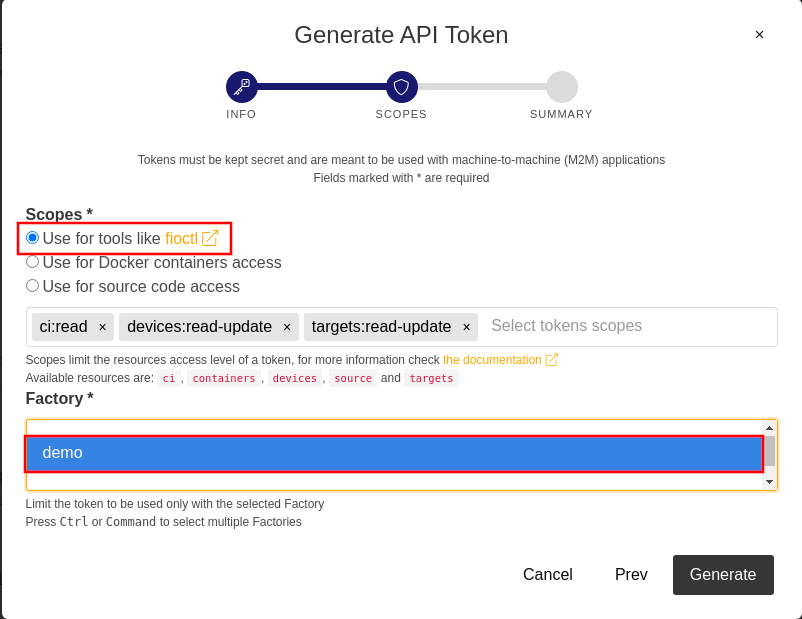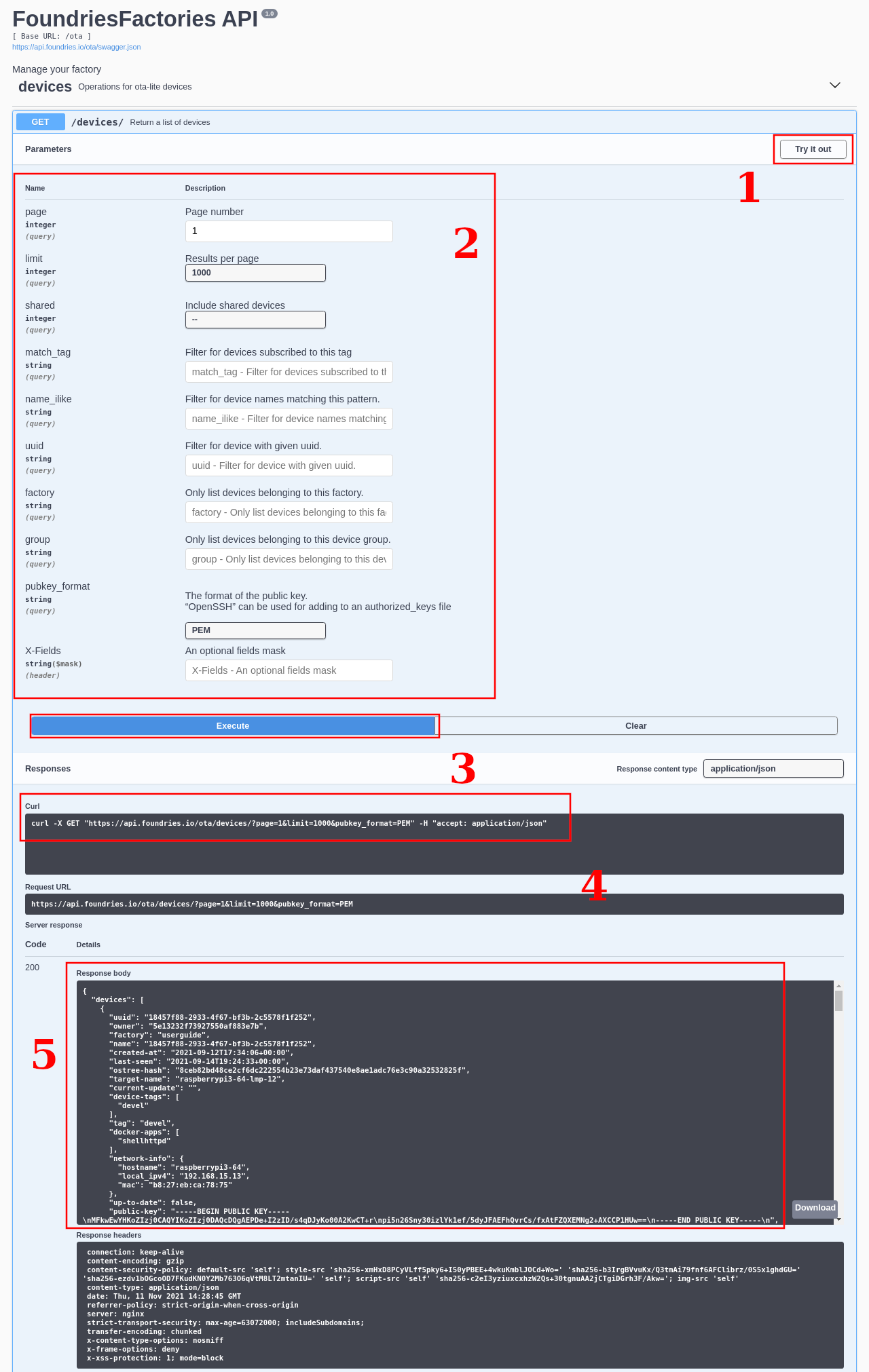Foundries.io REST API
Foundries.io™ implements a REST API that allows users to interact with their Factory and devices. This section examples use of the REST API with cURL (command-line tool for transferring data using various network protocols).
To follow this section, it is important to have:
Prerequisites
- Completed the getting started guide up to Flashing Your Device.
Creating Token
To interact with the Foundries.io API, create a token.
Go to Tokens and create a new Api Token by clicking on + New Token.
Complete with a Description and Expiration date, and select next.
Check the Use for tools like fioctl box and select your Factory.

Fig. 22 Token for REST API
Save the output, as this is is your <API_TOKEN> value.
Getting Started
The Foundries.io API includes a complete OpenAPI definition. To get started, configure your host terminal with the variables below:
export FACTORY=<FACTORY>
export TOKEN=<API_TOKEN>
Note
Make sure to replace <FACTORY> with your Factory name and <API_TOKEN> with the token value.
Device List
This function returns a list of devices registered in your Factory. The HTTP response includes the same data from your Factory’s Devices tab. Documentation can be found at Foundries.io API under devices.
Run:
curl -H "OSF-TOKEN: $TOKEN" https://api.foundries.io/ota/devices/
"devices": [
{
"uuid": "f4120660-ffbf-483f-b2ca-a6186da467f4",
"owner": "5e13232f73927550af883e7b",
"factory": "getting-started",
"name": "device-01",
"created-at": "2021-11-11T14:17:50+00:00",
"last-seen": "2021-11-11T14:17:57+00:00",
"ostree-hash": "cfacf42873aa06fbf53d7b1bfcb72032f21631b068620e575696ab2ab0670efd",
"target-name": "raspberrypi3-64-lmp-2",
"current-update": "",
"device-tags": [
"devel"
],
"tag": "devel",
"docker-apps": [],
"network-info": {
"hostname": "raspberrypi3-64",
"local_ipv4": "192.168.15.13",
"mac": "b8:27:eb:ca:78:75"
},
"up-to-date": true,
"public-key": "-----BEGIN PUBLIC KEY-----\nMFkwEwYHKoZIzj0CAQYIKoZIzj0DAQcDQgAE2l3TY/Gu8W+euAA8bVufhxmCK0YR\ngt3B8XPXGS4rVRD3jfjjf7cCJQ4GLtvs+phTgeLiRJwTyWzsFZGYxqN1aA==\n-----END PUBLIC KEY-----\n",
"is-prod": false,
"is-wave": false
}
],
"page": 1,
"pages": 1,
"limit": 1000,
"total": 1
}
Targets List
This function returns a list of your Factory targets. The HTTP response includes the same data from the Targets tab of the Factory. You can find documentation at Foundries.io API under factories.
Run:
curl -H "OSF-TOKEN: $TOKEN" https://api.foundries.io/ota/factories/$FACTORY/targets/
{
"raspberrypi3-64-lmp-3": {
"custom": {
"arch": "aarch64",
"cliUploaded": false,
"createdAt": "2021-07-28T20:40:39Z",
"hardwareIds": [
"raspberrypi3-64"
],
"image-file": "lmp-factory-image-raspberrypi3-64.wic.gz",
"lmp-manifest-sha": "b7d11e4f7d20f1fae63e1f54d8b5f48557fa40c1",
"meta-subscriber-overrides-sha": "7de1123998c9b362df278132fde8fccb57215647",
"name": "raspberrypi3-64-lmp",
"tags": [
"main"
],
"targetFormat": "OSTREE",
"updatedAt": "2021-07-28T20:40:39Z",
"uri": "https://ci.foundries.io/projects/getting-started/lmp/builds/3",
"version": "3"
},
"hashes": {
"sha256": "f190733c576920a203acd40d8df1cb82135aaf50f0b2c5fa8402745d73a633b3"
},
"length": 0
},
"raspberrypi3-64-lmp-2": {
"custom": {
"arch": "aarch64",
"cliUploaded": false,
"createdAt": "2021-07-28T20:15:29Z",
"hardwareIds": [
"raspberrypi3-64"
],
"image-file": "lmp-factory-image-raspberrypi3-64.wic.gz",
"lmp-manifest-sha": "b6483a7b0bd666b5b871662fa46477cdeede80f2",
"meta-subscriber-overrides-sha": "7de1123998c9b362df278132fde8fccb57215647",
"name": "raspberrypi3-64-lmp",
"tags": [
"devel"
],
"targetFormat": "OSTREE",
"updatedAt": "2021-07-28T20:15:29Z",
"uri": "https://ci.foundries.io/projects/getting-started/lmp/builds/2",
"version": "2"
},
"hashes": {
"sha256": "cfacf42873aa06fbf53d7b1bfcb72032f21631b068620e575696ab2ab0670efd"
},
"length": 0
}
}
Configure Device
It is also possible to send configuration files to your device or fleet.
To send a configuration file named app.config to your device.
app.config:
[page]
url = "https://foundries.io/"
- Convert the file contents into properly escaped JSON string:
[page]\nurl = \"https://foundries.io/\"\n"
Use the command below to create the
API_DATAvariable.Note that
valueis set with the file content, andnamewith the file name.export API_DATA='{ "reason": "API test", "files": [{"name":"app.config","unencrypted":true,"value":"[page]\nurl = \"https://foundries.io/\"\n"}]}'Define
DEVICE_NAMEand configure your device using cURL with-X PATCH:export DEVICE_NAME=<DEVICE_NAME> curl --data "$API_DATA" -H "Content-Type: application/json" -H "OSF-TOKEN: $TOKEN" -X PATCH https://api.foundries.io/ota/devices/$DEVICE_NAME/config/
{
"created-at": "2021-11-11T15:59:07",
"applied-at": null,
"reason": "API test",
"files": [
{
"name": "app.config",
"value": "[page]\nurl = \"https://foundries.io/\"\n",
"unencrypted": true
}
]
}
After a moment, fioconfig receives the changes, and you can find the configuration file on your device under /var/run/secrets/.
sudo cat /var/run/secrets/app.config
[page]
url = "https://foundries.io/"
Enabling/Disabling Application
You can configure what application or tag the device should use.
For example, to enable the shellhttpd application, you send a JSON file similar to:
{
"name": "z-50-fioctl.toml",
"on-changed": [
"/usr/share/fioconfig/handlers/aktualizr-toml-update"
],
"unencrypted": true,
"value": "\n[pacman]\n compose_apps = \"shellhttpd\"\n"
}
The command below adds the JSON to the API_DATA variable:
export API_DATA='{ "reason": "API test", "files": [{"name":"z-50-fioctl.toml","on-changed":["/usr/share/fioconfig/handlers/aktualizr-toml-update"],"unencrypted":true,"value":"\n[pacman]\n compose_apps = \"shellhttpd\"\n"}]}'
Define the variable DEVICE_NAME and configure your device using cURL with -X PATCH:
export DEVICE_NAME=<DEVICE_NAME>
curl --data "$API_DATA" -H "Content-Type: application/json" -H "OSF-TOKEN: $TOKEN" -X PATCH https://api.foundries.io/ota/devices/$DEVICE_NAME/config/
{"created-at": "2021-11-10T19:02:30", "applied-at": null, "reason": "API test", "files": [{"name": "wireguard-client", "value": "enabled=0\n\npubkey=J0H7CMG10TsTEai2Ui35KV0fb5oaJ8qd+mnWgIu091s=", "unencrypted": true}, {"name": "z-50-fioctl.toml", "on-changed": ["/usr/share/fioconfig/handlers/aktualizr-toml-update"], "value": "\n[pacman]\n compose_apps = \"shellhttpd\"\n", "unencrypted": true}]}
Learning More About the REST API
Logged into http://app.foundries.io, you may interact with the REST API from your browser at http://api.foundries.io/ota.
- Click on the operation to test. This shows the Try it out option.
- Customize parameters.
- Execute to test.
- Once executed, it displays a cURL command reference.
- Check the response:

Fig. 23 Foundries.io REST API page illustration
This allows you to explore the Foundries.io REST API and its possibilities.